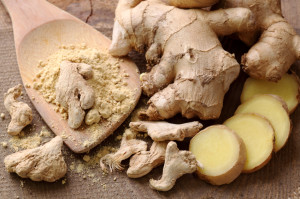Inflammation is the normal and natural response to body injury; however, unnecessary and chronic inflammation can wreak havoc on the body and promote illness. The modern diet contributes to inflammation through a variety of body mechanisms that are not completely understood. Eating too many fried foods, processed foods, omega-6 fats, saturated fat, refined sugar and trans fats have all been linked to increased inflammation. You can combat this inflammation by focusing your food choices on anti-inflammatory options. Following an anti-inflammatory plan is similar to the Mediterranean style of eating and is designed to reduce inflammation and improve overall health. Below are the top 10 anti-inflammatory foods that should be added to your weekly diet!
- Ginger – A popular herb used in cooking and medicine. The active compounds are effective against nausea, motion sickness, abdominal distress and joint pain.
- Shiitake mushrooms- An excellent source of B vitamins, vitamin D (if sun dried), potassium and phosphorus. These powerful fungi boost immunity, reduce blood clots and inflammation.
- Green tea– Regular consumption is linked to lower risk of heart disease and reduced inflammation and risk of cancer. Aim for 2 cups a day to get the optimal antioxidant benefit.
- Pineapple – Rich in vitamin C, manganese and a type of enzyme called bromelain that is anti-inflammatory and may help relieve arthritis pain.
- Raspberries – The high level of antioxidants, vitamin C and ellagic acid help protect cells from free radicals; therefore, reduce cancer risk.
- Avocado – The oil contains phytosterols, vitamin E and a unique fat profile that supports a healthy inflammatory response. It also has a high smoke point making it less susceptible to carcinogen production during cooking.
- Cauliflower – A rich source of sulforaphane that inhibits stomach inflammation. This cruciferous vegetable is also high in carotenoids, vitamin C, vitamin K, fiber and folate.
- Spinach – A powerhouse of phytonutrients that reduce inflammation and fight cancer. High in vitamin A, vitamin K, folic acid, magnesium and iron (when combined with a vitamin C source).
- Flaxseeds – A great source of alpha-linolenic acid, an omega-3 fatty acid. For individuals who do not like fish, this is a great addition to your diet. Flaxseed is easily used if bought milled or ground which will also increase fiber consumption.
- Grapes – Phytochemicals in grapes have been found to reduce risk for metabolic syndrome, high blood pressure and inflammation. Each color of grape has a slightly different nutrient make-up so be sure to eat a variety!

